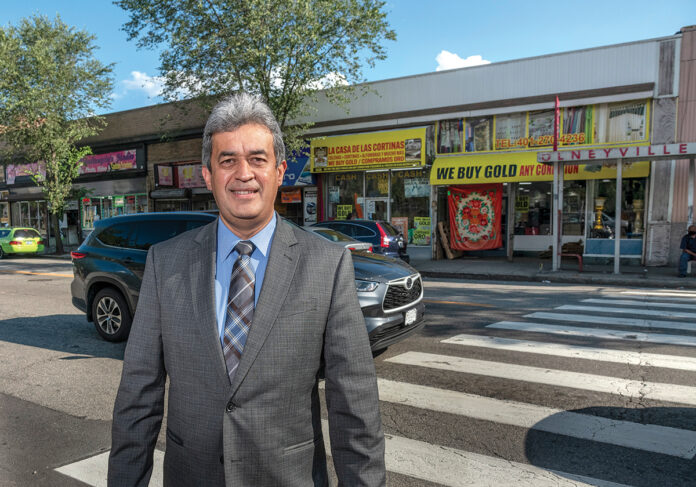(Editor’s note: This is the second installment in a monthly series speaking with minority business owners and leaders. View the first installment here.)
Oscar Mejias didn’t have much choice when he and his family fled Venezuela in 2003 amid political persecution.
But that nightmare started a journey that eventually led him to Rhode Island, where he is now CEO of the Rhode Island Hispanic Chamber of Commerce and a business owner.
In Venezuela, Mejias had been a midlevel executive at Petróleos de Venezuela, a state-run oil company, when he joined thousands of his colleagues in a strike intended to force the resignation of then-Venezuelan President Hugo Chávez. It failed, and when Mejias refused to cooperate with government officials who wanted information that could have been used to build criminal cases against his co-workers, he was forced into hiding.
A militia was stationed outside his home, ready to arrest him if he returned.
After filing for asylum in the U.S., Mejias and his wife decided to leave their homeland with their two daughters, who were 5 and 12 at the time. For four years in Florida, he struggled to make ends meet, taking jobs cleaning offices and delivering newspapers, magazines and pizzas.
“I never lost my horizon,” said Mejias, who had a degree in information technology. “It was my goal to have a business.”
‘From a business point of view, the situation has been slowly changing.’
‘From a business point of view, the situation has been slowly changing.’At the urging of his brother-in-law, Mejias moved to Rhode Island in 2007, where he worked at a car wash until the nationwide financial collapse in 2008 that touched off the Great Recession.
In the crisis, Mejias saw an opportunity to help others in the Latino community who were struggling for success against barriers such as language, education and technology.
“I couldn’t find anyone who wanted to help or who was already helping,” he said. “So I just did it myself.”
He created the Hispanic Technology and Education Program, a vocational school he operated in North Providence for nearly a decade aimed at helping Latinos improve their technology skills and find a job.
Today, Mejias is the founder and CEO of the Emerging Studies Institute, a bilingual vocational and technical school that opened in 2017, and he leads the Hispanic Chamber, which he established in 2016. Mejias said the organizations exist to help Latinos and Latino-owned businesses get ahead.
Located in the Olneyville section of Providence, the Emerging Studies Institute offers certificate classes on bookkeeping, entrepreneurship, cybersecurity, leadership, among others. The business closed when the pandemic arrived in March, but Mejias plans to reopen in late October with about 120 to 130 students.
The Hispanic Chamber has 193 members, but Mejias still sees barriers for Latinos trying to venture into business, including a lack of connection with the larger business community and key government agencies. For example, R.I. Commerce Corp. recently announced the availability of Restore Rhode Island grants for struggling small businesses during COVID-19, but Mejias said many of his members still don’t know about them.
“That means there are not effective communication channels within the community,” said Mejias, who noted that R.I. Commerce began providing information in Spanish two years ago, and other state agencies are just starting to follow suit.
Mejias does see progress within the Latino community. “I could say that we are starting to break down barriers,” said Mejias. “But this is just the beginning.”
Do you believe racism is keeping minorities from starting businesses in the Ocean State or succeeding when they do? No. That’s what happened in the past. I can say that in recent years, from a business point of view, the situation has been slowly changing. The minority-business community, especially Latinos, has been growing fast, and with them, several organizations that work for the benefit of minorities in Rhode Island, [such as the Rhode Island Hispanic Chamber of Commerce], which has helped to lessen this situation. We also see a good intentionality from the state agencies that direct the economic aspect in Rhode Island.
How dependent are most Hispanic-owned businesses in the state on the support of fellow Latinos and other minority groups? Is that a sustainable model? The Latino community has been characterized by supporting its businesses. The identification with the culture of their countries of origin has contributed to this trend. A very good example are restaurants and supermarkets/bodegas, where Latinos can buy meals and products that connect them with their roots. The ease of language is also a factor that influences this support. It is a sustainable business model to include Latinos and other minorities as their primary target.
What one thing could Rhode Island do to boost the odds for minority-owned business success? Maintaining and creating new programs to support and promote minority businesses, [such as] some initiatives implemented by [R.I. Commerce Secretary Stefan Pryor]. Educational and financial support programs adapted to the minorities’ specific needs are fundamental factors to boost and promote the minority-owned business success.
Have any of your members had to turn somewhere other than a bank for a loan? Do you believe the state’s lending institutions generally treat minorities fairly? Yes, there are a number of cultural factors that promote this practice where a Latino entrepreneur prefers to turn to family members or other sources to obtain funding. But that’s another element that’s been gradually changing in our state. With the rise of banks that understand and work with our communities of color, this practice has been declining. Organizations [such as] the Hispanic Chamber of Commerce have been building partnerships with these financial institutions to help our entrepreneurs gain access to better funding from these institutions.
If another minority entrepreneur asked you where they could turn to for support for their business, where would you direct them? One of [the Hispanic Chamber of Commerce’s] major accomplishments is the creation of a network of organizations that collaborate to provide services to our constituents. We have established collaboration agreements with the Rhode Island Black Business Association, Center for Southeast Asians, Multicultural Innovation Center, government agencies, and other public and private organizations. So, when an entrepreneur approaches us to require support for their business, we refer them to the organization that can best satisfy [their] needs or we help directly if it is required.
Alexa Gagosz is a PBN staff writer. Contact her at Gagosz@PBN.co












